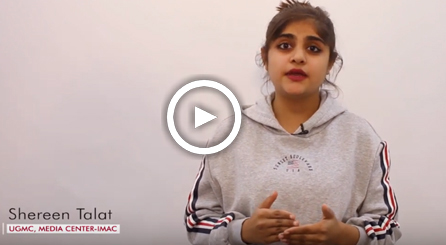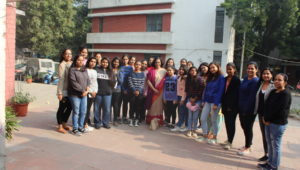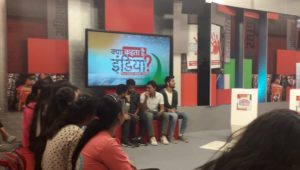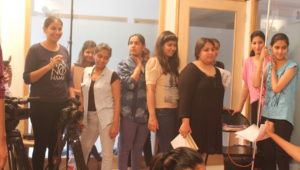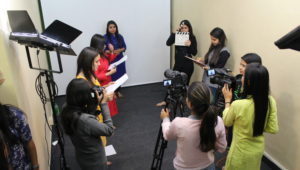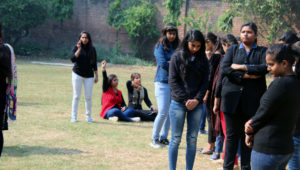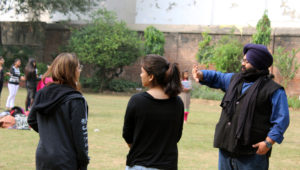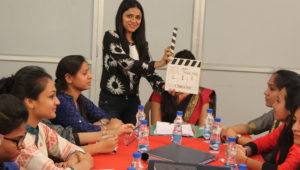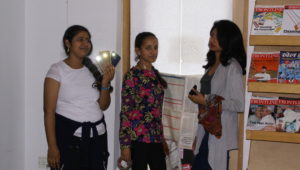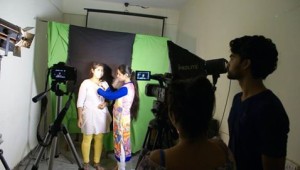An anchor must be skilled and experienced in interviewing newsmakers and in gathering, writing and reporting the news. They must be familiar and proficient in the preparation of news scripts and the production techniques of tape editing. May be assigned to prepare and assist in the production and airing of news specials and public affairs programs. Develop and maintain news sources throughout the community.

QUALIFICATION: To carry out this job successfully, an individual must be able to perform each essential duty satisfactorily. The requirements listed below are representative of the knowledge, skill, and/or ability required. Reasonable accommodations may be made to enable individuals with disabilities to perform the essential functions.
EDUCATION and/or EXPERIENCE: Bachelor’s degree (B. A.) from three-year College or university in Journalism, English and/or Communications isn’t mandatory but desirable. Extensive reporting and anchoring experience in medium and large markets required for consideration for this position. Other journalism experience (radio, wire services, newspapers) may be substituted for some major market experience; or equivalent combination of education and experience.
LANGUAGE SKILLS: Ability to read, analyze, and interpret general business periodicals, professional journals, technical procedures, or governmental regulations. Ability to write reports, business correspondence, and news stories in a concise, balanced manner free of bias, distortion or poor taste. Must have language skills to handle live reporting, interviewing and impromptu situations from the field using ENG equipment in an orderly, professional manner. Desktop editing of video on computers will be required in this job.
REASONING ABILITY: Ability to define problems, collect data, establish facts, and draw valid conclusions. Need to be thoroughly professional in all aspects of journalism. Must be well read on current affairs and have a wide-range working knowledge and understanding of general interest subjects, current events and people in the news.
CERTIFICATES, LICENSES, REGISTRATIONS: AFTRA union membership required.
OTHER SKILLS and CAPABILITY: Use of two-way radio, telephone and newsroom computer system. As an aspirant you may be required to travel. As an on-air personality and journalist, must have that unique ability to communicate that creates for the viewer a feeling of involvement, sincerity, professionalism, authority, knowledge, enthusiasm and friendliness.
PHYSICAL DEMANDS: The physical demands described here are representative of those that must be met by an employee to successfully perform the essential functions of this job. Reasonable accommodations may be made to enable individuals with disabilities to perform the essential functions.
While performing the duties of an anchor, you’re frequently required to talk or hear, stand, sit and walk. Specific vision abilities required by this job include close vision, distance vision, and peripheral vision.
WORK ENVIRONMENT: The work environment characteristics described here are representative of those an employee encounters while performing the essential functions of this job. Reasonable accommodations may be made to enable individuals with disabilities to perform the essential functions.
While performing the duties of this job, the employee frequently works in outside weather conditions. The noise level in the work environment is usually moderate.
DAILY WORK ACTIVITIES: Work activities vary according to the type of programme and broadcast medium. Prior to the broadcast, however, presenters may be involved in researching topics and backdrop information for items to be featured on the program:
- Planning and Rehearsing Shows;
- writing, and sometimes memorizing, scripts ;
- Liaising with other members of the production and technical team/s. During the broadcast, presenters may be involved in:
- Introducing and hosting programs;
- Interviewing guests in the studio, by telephone or on location;
Playing music; Reading short news, traffic, sport or weather reports; - Reviewing books, films, music or newspapers; Providing links between programmes;
- Either reading from a script and/or autocue, or improvising;
- Keeping the program running to schedule – responding positively and quickly to problems or changes, and improvising where necessary;
- Keeping in contact with the director and the production team in the studio gallery via ear-piece.
After the broadcast, presenters may be involved in meeting with the production crew to assess/review the broadcast and plan the next broadcast. Radio presenters on music shows usually ‘drive’ the desk and operate some of the technical equipment for recording and playback. This generally involves using computers to cue up and play music and jingles.
[This article is published by Media Center-IMAC in interest of student awareness and career guidance. Media Center-IMAC specializes in Post-Graduate/Under-Graduate diploma courses in Media Studies and Mass Communication & TV journalism. With practical oriented and industry specific course, Media Center- IMAC is a prominent institution in Delhi.
Our alumni have proven themselves in the media world and are currently working at prestigious media organizations and top news channels. Besides full time diploma courses, Media Center-IMAC also offers specialized certificate courses in TV reporting, Digital marketing, video editing, radio jockeying, photography and many more.
For more info, visit: http://www.mediacenterimac.com/
Or email at: mediacenterimac@gmail.com
Or call at: 011 43489010, 8076807939.]








